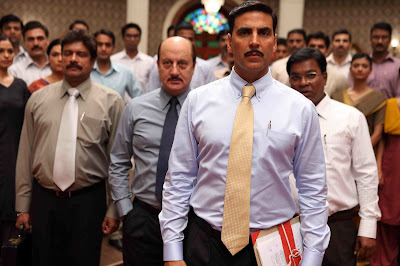Surrounding the Oscar
buzz that has seen a strong lead up in the past two weeks with hefty
candidates like Lincoln and Zero Dark Thirty releasing
in succession, expectations were high for David O Russell's Silver
Linings Playbook. The film is surprising to say the least.
Nominated for best picture alongside some of the grandest and
brilliant cinema, the film astonishes you by being a simple and fine
slice-of-life drama that charms everybody who enters the cinema hall
expecting life-altering cinema.
Adapted from the namesake
novel by Matthew Quick, the film is based on a simple premise: Life
doesn't always go according to the plan. Pat Solatano, returns home
from a rehab facility having lost everything -- his house, his job
and his wife. Determined to rebuild his life, Pat, who suffers from
bipolar disorder, finds himself at his parents' home. Pat's father is
a heavy book-keeper and gambles on every football game, and all he
wants from Pat is to get back on his feet. Then comes a turning point
when Pat meets Tiffany, a mysterious widow with problems of her own.
Things get complicated as the two perceptibly complex and crazy
characters try to help each other set their respective lives
straight.
Between The Fighter
and this film, the only link Russell has maintained is the honest
realist treatment. Taking complex life situations, like restraining
orders, creating drama around it in such a carefree manner makes this
story, about the struggle of two outcasts, a treat to watch. The
portrayal of these characters too, is highly important and extremely
fragile; and Bradley Cooper and Jennifer Lawrence are flawless. On
one level, the film is a regular Hollywood romantic comedy, but
Cooper and Lawrence give it that extra dimension that is missing from
all those sickeningly sweet stories which show the characters in soft
focus and always have a predictable happy ending.
Of course, Silver
Linings Playbook has an happy ending too. But it dodges the
bullet of predictability every time you feel that it's approaching.
The film proves that the genre of romance can still conjure good
cinema and it doesn't necessarily need a satire or a high-budget
biopic or a complex philosophy to make excellent cinema. A seemingly
real love story with a happy ending that also has a little moral
attached to it, the film tells us that our happiness doesn't really
depend on finding the people who correct our shortcomings, but
instead on finding people who are unconditionally willing to co-exist
with our unique brand of madness.
The film is a lesson in
simplicity and you leave the theatre with a smile knowing you have
the power to make positive changes to your imperfect and bleak life;
and in more than one way, it teaches you to see the silver lining on
every dark cloud that comes your way. A nervy dramatic rom-com,
Silver Linings Playbook is a film that fits the insecurities
and anxieties of the times we live in.
Rating - 4 out of 5
Published in DNA After Hrs (Pune) on February 24, 2013






















com.jpg)




